As with most industries, the hotel industry is mainly using big data tools to improve marketing, better-targeted ads, predicting demand patterns, analyzing rates to name a few.But what if we began applying some big data analytics to hotel operations? How could we improve hotel operations by analyzing hotel maintenance and housekeeping?As a former engineer for Dane-Elec, I have been exposed to big data since the 1990s, long before it became a buzzword for marketing people. As I transitioned from Dane-Elec to starting my own company, I began building what now is a state of the art hotel housekeeping and maintenance tool that is now used in hundreds of hotels around the world. But I couldn’t have done it alone, I had the help of my trusted colleagues.
While, we’re overjoyed by how much help this is bringing to the hotel staff, including the housekeeping and maintenance teams, front desk personnel, and many other hotel employees, we’ve also been wondering, how could we use all this endless amounts of data to take it one step further and improve things more?There is tons of information that can be used just by understanding the data.For instance, managing one’s P&L and balance sheet, investing in renovations, are all actions that can be improved by understanding and using data.RoomChecking is piloting functions that measure the lifespan of furniture, equipment, and consumables in hotel rooms. We are answering questions such as, how long will the light-bulbs last based on regular use? And, does changing to a cheaper brand actually cost less or will it cost more?What’s even more remarkable is RoomChecking can provide hotels with predictive data based on the overall hotel history. We gather endless amounts of data, not only the age of the room's equipment, but we also incorporate the occupancy of the room. We remove the guessing out of when someone thinks an item should be replaced.
In this article from Herbert Mascha on Hotels Magazine, Herbert discusses the value of preventive maintenance for hotels. With a layer of data and systems in place this becomes not about static procedures but dynamic data based tasks generated at the right time. By being able to understand the data accurately you are able to budget accordingly for these elements based on replacements and the frequency of the replacements.But that’s just a small part of it.The aim is to transform a hotel from doing random inspections to intelligent, data-driven ones.It is customary in the hotel industry, if we discover something that isn’t right, then we fix it. But unfortunately, we discover too many of these issues from guests. How great would it be if the guests never had to find out about these issues because the system predicted it and sent a preventive inspection request to the hotel maintenance team?Similarly, with housekeeping, we’ve covered this before in our Work Better, not Harder article. By using data mining and displaying this information to the right person, applications like RoomChecking can optimize work sequences enabling staff to do similar tasks grouped together. Meaning they can avoid carrying huge carts of all the possible equipment they may or may not need all the time.The data permits us to optimize room cleaning sequence, enabling the housekeeping staff to clean similar rooms at once and even grouping staff to work together for certain tasks that require multiple people.There is still a lot of work to be done in this field. Hotel operations, like all manual work, can be optimized allowing the staff to focus on the work that is critical and can remove wasted time and effort that can be done with a machine.We’re only getting started, there is so much more we have in the pipeline. Hotels of every size will be able to benefit from it. Of course, larger hotels and chains will be able to see the biggest benefits, but even smaller hotels will see a huge benefit. This isn’t just about profit and loss, it is about improving job satisfaction for all employees, which in return will improve guest satisfaction, and that’s where the real benefit comes in.
We’re in a time where we can make very precise decisions using much more and reliable data than ever. As an industry for us to dramatically improve the guest experience in every hotel, we need to use technology to keep making those hotel stays magical for guests.
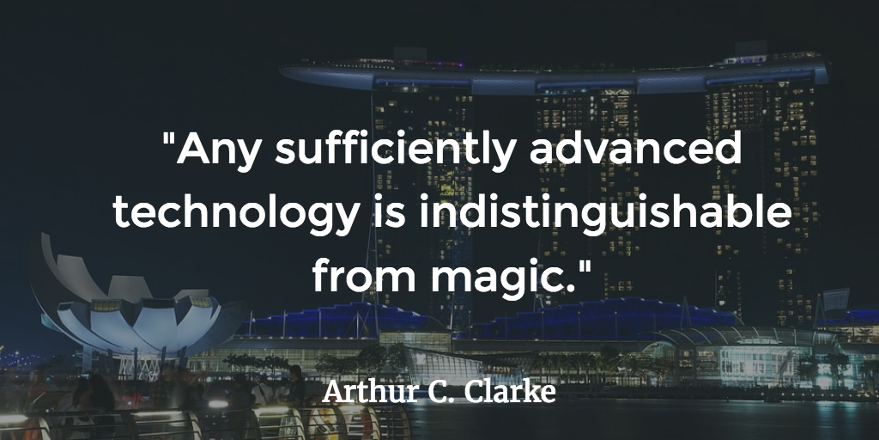
eeping a hotel in perfect condition and ready do deliver great guest experience is a lot more than just "having a crew" there are so many details involved.
Some striking points are how many tasks need to get solved before guests can occupy a room. Did you know that there's a new task created for every 2.12 rooms cleaned? That's a lot. Consider that many of those tasks are blocking - meaning the room can be released to guests until the task is fixed!
We've installed RoomChecking in hundreds of hotels by now and have a ton of data that our clients use to optimize their hotel, so we pulled some of it to help illustrate what really goes on behind the scenes in a hotel.
We found the data quite revealing, especially for non-housekeeping staff who might not be totally aware of how much work it takes to get a room ready for the guests. We like to compare it with putting on a show, every day thousands of invisible tasks and actions need to be done, and the show must go on!
Between 36% and 61% of the hotel's guests leave every day. Meaning a lot more work for the housekeeping team. On average it takes 31.5 minutes to fully clean a room that is being released that day, that's more than 30% more time than it takes to clean a stayover room.
The good news is that on average there are more stayovers than departures in a hotel. Between 39% and 60% of the guests stay another night and the time it takes to clean those rooms is 20.5 minutes.
And in addition to that almost 7% of the hotel's room are not to be cleaned either because of refusal or Do Not Disturb.
Some larger hotels generate an average of 60 tasks a day. That's a huge amount of additional work orders that need to be managed, especially that many of these can block a hotel room and leave guests waiting.
On average there is one task generated for every 2.12 rooms. So you can do the math yourself to figure out how many tasks are happening in your hotel. And then try not to think about how many of those tasks never made it to the recipient if you don't have a proper housekeeping and maintenance system in place.
From those tasks, 38.6% are for the hotel's maintenance team.
The Front Desk team are the ones who have to face the guests every day, they've got to keep the smile on and reassure the guests that everything will be taken care of and so they also issue tasks for Housekeeping and Maintenance, of all the tasks issued, they issue 26.8% of them.
What's maybe a little scary is that some 30% of the tasks never get completed, even when there is an advanced system in place to track them. What does that say for hotels who still use post-it notes to track these tasks?
But the show must go on, and the fact that 28.9% of tasks were completed within an hour explains why some hotels just excel at guest experience.
We wrote about Lost and Found in hotels recently and shared a bunch of numbers and some tips on how hotels could fix that.
From our tracking we noticed that on average 2.16% of hotel rooms had lost items in them, it makes one wonder how hotels keep and track all those many lost and found items. Considering that some of these items are valuable items. But there are some days where almost 12% of rooms have lost items in them.
We published all this in an infographic that we're sharing here.
Hotels manage thousands if not millions of details to make guest experience great. The front-of-house does incredible work to keep guests happy, while the back-of-house, the Housekeeping staff and hotel Maintenance, staff work really hard to ensure no details are left out.
As guest expectations keep increasing - it is more and more important for hotels to use advanced systems to ensure all those details are happening in a coordinated manner to ultimately raise the level of guest experience in your hotel.
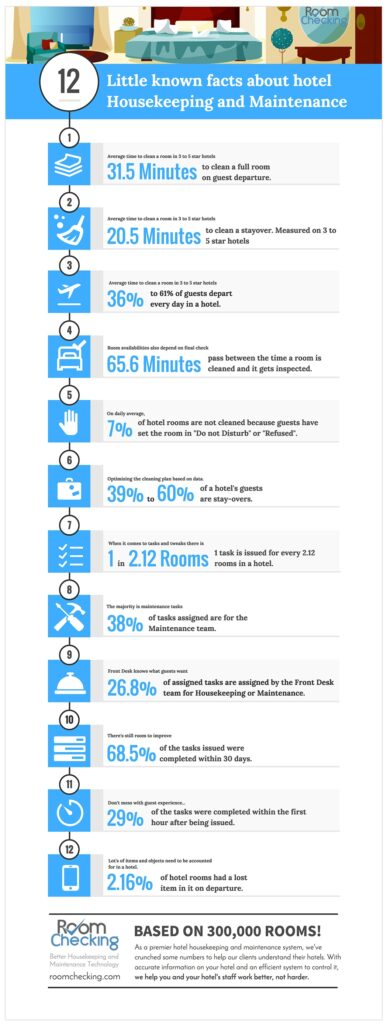
he hospitality industry is one the of the oldest industries in the world, often grounded by tradition. With processes, procedures, and a hierarchy all working together in the background to ensure all the million and one things that could go wrong with a guest don’t.
Yet, there is still room for improvement.
One important question that comes to mind is how do you introduce technology to a hard job such as housekeeping, without slowing down their workflow and making things harder? (and for those who have never cleaned a hotel room, you won’t fully understand what I mean).
Think about this statement from Richard Branson, “If you take care of your employees, they will take care of your business.” To achieve an extraordinary guest experience you must abide by this simple, yet powerful statement. You’re probably thinking easier said than done.
While that statement looks incredible feasible on paper, it doesn’t account for the random problems and request that are likely to occur, unless technology is added to the mix.
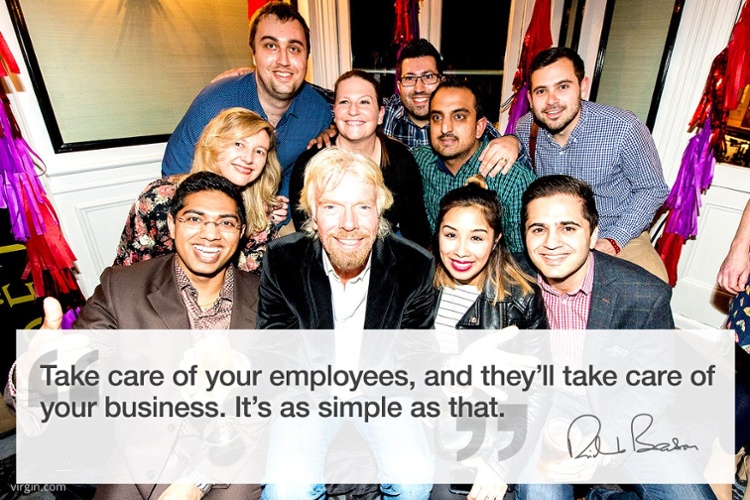
Imagine this scenario:
“Is room 209 ready? The guest is waiting in the lobby!” says the front-desk frantically.“It’s only 12:00, the room will be ready by 15:00” says the housekeeper frustratedly.
A little later, the phone in room 209 rings again, this time nobody is answering.
These are common conversations that occur in hotels, the front desk calls the inspector who then has to check with the housekeeper to see if the room is clean. If it’s not clean, the inspector quickly has to reassign rooms on the fly to ensure that the waiting guest is taken care of immediately.
No matter how you look at the situation, it’s not an ideal environment for your staff.
Adding in these high priority changes and interruptions, the already tough job of cleaning rooms instantly became tougher. And even worse, sometimes these rooms are left in subpar conditions causing distress to your guest.
Yet communication is a necessity. It isn’t the communication itself that is wrong (though it often feels that way) but the interruptions.
To make things worse, the constant ping-pong communications that bounce from one to the other, often lacking the right information and worsening the situation. Take a look at this example.
Is the room ready?
Yes. I just checked the room it isn’t ready. I thought you meant the other one. No, I meant this one. Oh ok. So when is it ready? I need a little more time. Well, how long? 10 minutes. 10 real minutes or “10 minutes” About 20 minutes actually. Etc.
And fixing that required analyzing much more than chatter.
To ensure the housekeeping communications are efficient we had to fully understand what the content of the communications contains.
Building another Slack clone or WhatsApp group chat wasn’t the solution, we had to build a tool that would be a conduit for work.
We changed the way communication was done. The idea entailed that all conversations would be automated so the staff could focus on getting their work done without being interrupted and having one autonomous message, which leaves no room for guessing what that person was trying to explain.
For example, the inspector assigns the rooms to their staff, the housekeepers receive their assigned rooms in the priority they need, do their work, and select complete using their smartphone when they are done. The maid should never have more than 3 taps making their workflow seamless and uninterrupted.
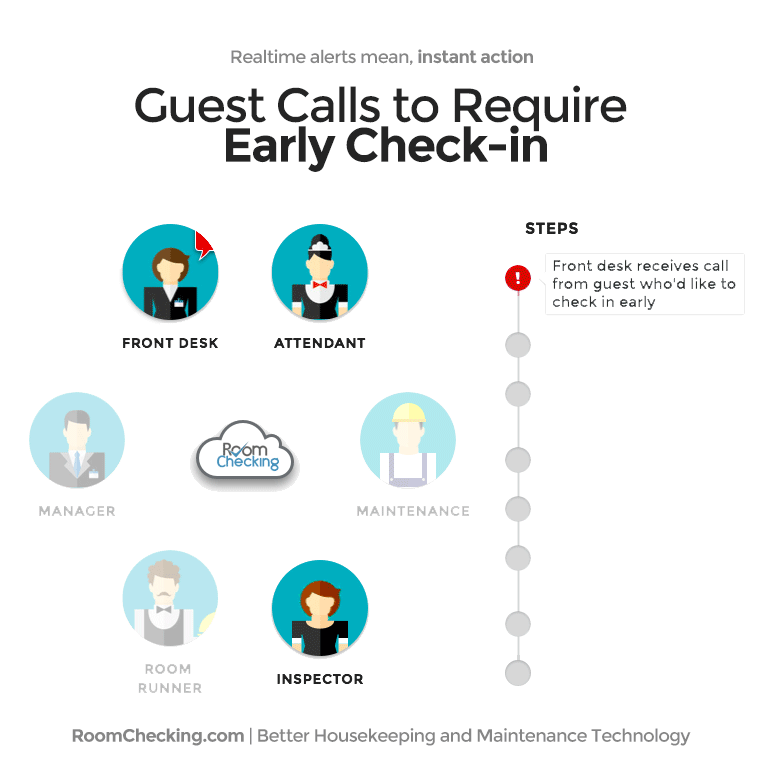
If rooms need to be reassigned due to waiting guests in the lobby, the Inspector has the ability to quickly reassign the room to the housekeeper, making the room a priority, with the click of a button on their tablet. No phone calls were frantically made, the housekeeper simply got a pop-up message alerting them they have a new priority room to clean. As soon as the housekeeper is finished cleaning the room, they simply select the complete button, the front desk immediately gets a notification that the room is clean and the guest can be sent to their room.
RoomChecking gives the Inspector and the Front Desk peace of mind. Instead of worrying about the details of who specifically is assigned to each task or each room cleaning, they can focus on ensuring the guest is satisfied and trust the system is working in the background.
When the housekeeper notices an issue that maintenance needs to fix, they can simply assign a task to the maintenance team. The inspector can inspect to ensure the maintenance task was completed. This means automated routing, eliminating the need for radios or groups receiving updates for every single task including the ones that are irrelevant for them. Or even worse, calling multiple people to find out who should take care of this one issue.
There’s the concept of synchronous tasks versus asynchronous tasks. Synchronous happens at the same time in multiple places, whereas there asynchronous or linear tasks happen one after the other.
For instance, when a room is cleaned, but still needs to be verified, then gets verified but needs a maintenance issue fixed this is an example of synchronous. Asynchronous is when there are hundreds of rooms that need to be clean and the most efficient way is to clean one right after another without stopping or waiting for something else to happen.
Our tasking system is built to assign tasks to the right person at the right time. This allows staff to move on to the next tasks without having to wait for the person to acknowledge the receipt of the message. If a room needs to be cleaned, the housekeeper gets notified and once they complete their job they can move on to the next assigned room.
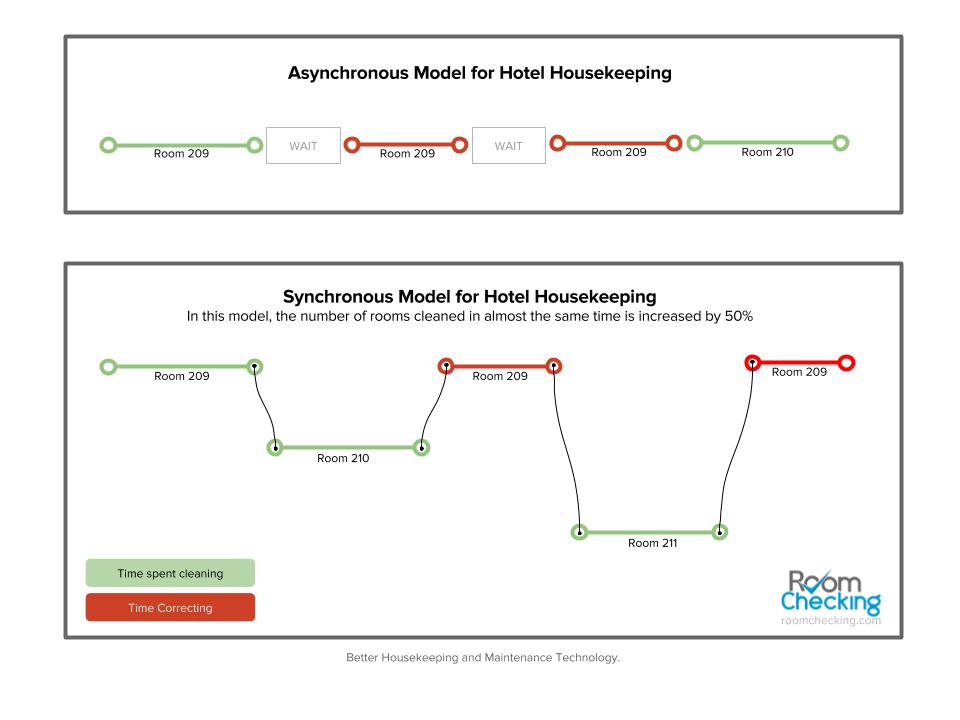
Another example is when the maintenance receives a notification they have been assigned a task, once this task is complete, they are able to hit complete on their smartphone alerting the inspector that this task has been complete. The inspector can then release the room to the guest. No need to call or interrupt a second maintenance person who is busy on a ladder in another room doing a different task. By assigning tasks correctly we make the communication efficient and other staff members can focus on their tasks without constant interruptions.
When a great system is implemented what happens is Housekeeping and Hotel Maintenance staff who have more time to get their work done. They are empowered to prioritize their time themselves because they know what to expect and don’t have the burden of the stress that someone is going to interrupt their work every few minutes.
This drastically improves the guest overall work satisfaction allowing them to be happier at work. This happiness naturally shines through when they are working with the guests. And the result is better guest satisfaction because they are able to deliver an extraordinary experience.
That makes all the difference.
ome time ago as I was checking out of our hotel, my 11-year-old daughter looks at me with a sad face and says “Daddy, I think I left my iPod in the room.” This sent me into pure panic mode, on one hand I was frantically trying to figure out where her iPod was, my other children were disappointed about the holiday ending, and to make matters worse the taxi outside was threatening to leave, which would strand us at the hotel causing us to miss our flight home.
Needless to say, it wasn’t the ideal situation.
To my surprise, this upscale 5-star hotel did not register lost items. Upon asking why, I discovered that they only register items that have been found, and had no way to register items that were lost. Even more disappointing was the fact they didn’t take my name or number to contact me if the item was found. They had insisted that I call in a few days to see if an employee located the item. As a guest, at a 5-star hotel this shocked me that they couldn’t make the effort to contact me directly.
Fast-forward to a few weeks ago, I am installing RoomChecking in a hotel group, and I first hand understood the problem hotel's face. What seemed like a simple problem for me, the guest was far more complicated than I anticipated for the hotel.
The first problem that was brought to my attention was storage, where does the hotel keep these items? Certain lost and found objects are valuable others are not, how do you differentiate?
The next big question is timing. When was the object found, before my stay, during my stay, after my stay? Or what if it was found a few days after another guest stayed in the room? This adds a whole new dimension.
Who found the object? The hotel's housekeeper? Runner? Hotel Operations? Hotel Maintenance? Management? These are all important questions that need to be answered as well.
How do you properly label lost and found items ensuring they can be easily located? Do you use a number system? Do you use a label maker? Is everyone at the hotel using the same labeling method? In my experience with hotels, I’ve identified at least 50 different ways hotels manage labeling lost and found.
When integrating the Hotel Lost and Found tool into RoomChecking we analyzed the problem from various angles. Our goal was to figure out how to improve the process without changing the workflow. When adding a layer of technology, our goal at RoomChecking is to make your life easier, not harder.
Understanding that large and small hotels operate differently, we built our lost and found module in 4 different segments based on hotel size. By doing this, we are able to accommodate different size hotels without disturbing your current workflow.
Managing a hotel is firefighting with guest requests and invisible issues every day. The magic of a great hotel is how many of these "fires" guests never even get to see. This is what hotels are really good at and they're probably some of the best at it of any industry. When technology can come along and help hoteliers do their job easier and safer, when tech companies can help to facilitate the firefighting by relieving the front desk, housekeeping and other hotel staff from some of that pressure and stress. It is definitely worth it.
In the end by adding tools that facilitate all these types of tasks the people in hotels can focus on the real job which isn't printing labels, figuring out who was in room 209 that could have lost an iPod or other mundane, repetitive tasks like that. Hoteliers can then focus on taking care of guests and improving guest satisfaction.
And that's our end game, I think that should be the end game of all hotel technology companies: Happier guests.
In case you were wondering, shortly after we left the hotel, they were able to locate and return my daughter’s iPod.
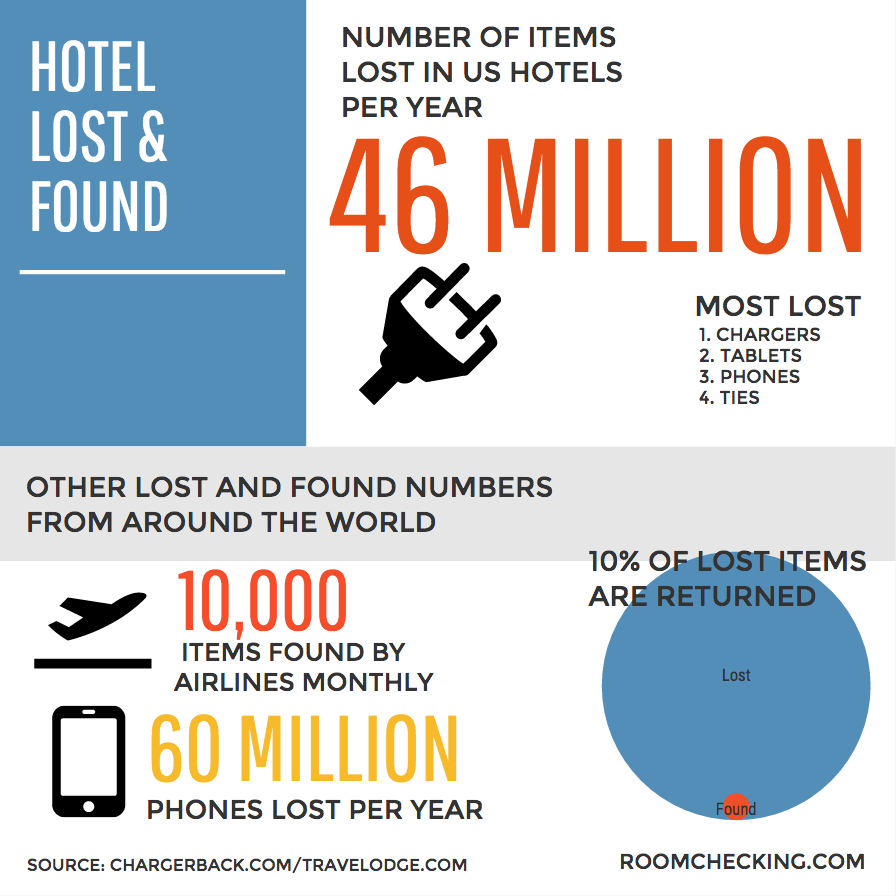
Change can be a scary thing, especially when revenue is on the line. Many hotels do not take advantage of possible technology solutions because they fear the training and implementation processes will take too much time and cost more than the system will end up being worth. However, technology is evolving at an increasingly rapid pace, and hotels are falling behind. Between the commission costs of OTAs and the threat of the sharing economy, can hotels really afford not to invest in new technology right now?
The demands of advancing guest-facing technology also calls for an improvement in back-of-house technology, but this comes with its own set of problems. If back-of-house employees like housekeepers, attendants and maintenance workers are not accustomed to working with these types of applications, or if there is a substantial language barrier, training them to use a new application can prove difficult.
The key to successful implementation of a new technology is to focus more on adoption than deployment. A solution is only as effective as those employing it, but if adequate time and training measures are not taken to ensure that employees not only know but are comfortable using the solution on their own, the application will not be used to its full potential.
If they are using the app, employees should be able to positively answer the questions “Why do we have this application?” and “Does it help my everyday workflow?” Training should not only show HOW to use the app, but demonstrate WHY a new solution is being integrated into the workplace. Is it to streamline communication between teams? Is it to make scheduling easier? Is it to help respond to guest requests more quickly? Whatever the reason for adopting the new technology, employees should be able to immediately answer these questions.
Planning ahead of time for the time and resources that adoption takes will make the process run much more smoothly. Communicate the needs of each team ahead of time to the implementation team, so discrepancies in language and technological skill level can be accounted for and worked around. Establish a point of contact for the application within the hotel who will provide support on-premises and can alert the appropriate people if there is an issue, either within the hotel system or a third-party provider.
Despite the possible challenges, employee-facing applications are not only great for internal hotel organization, but a way to ease employees into adopting new technology, which could prove crucial for future adoption of guest-facing applications.
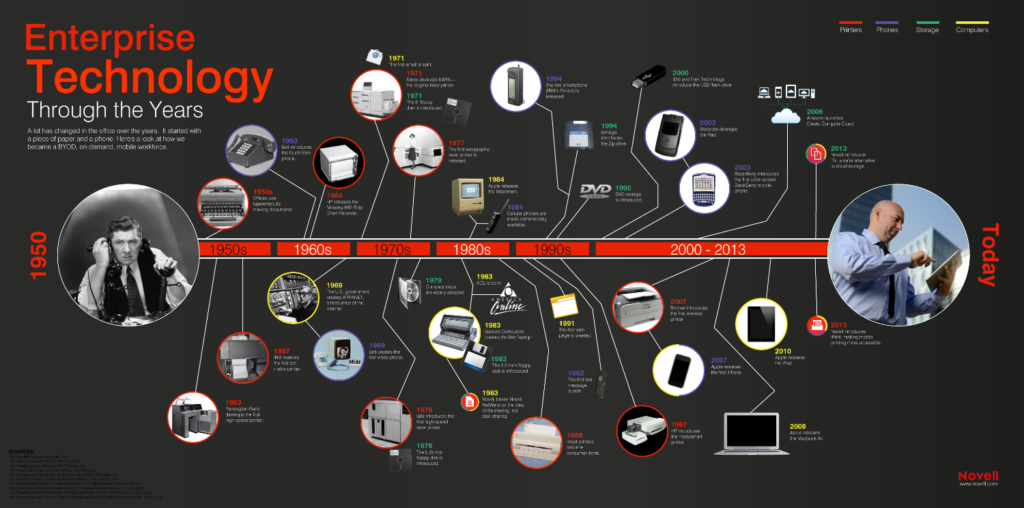
When developing a hotel budget for the coming year, two of the biggest questions hotel executives and managers must answer are in regards to technology spending: how much should be allocated towards hotel technology, and how should that amount be distributed? Determining which solutions should be a priority for the hotel can be a challenge, given the fast-developing nature of the technology industry and quick-adoption tendencies of hotel guests.

According to the 2016 Lodging Hospitality Study by Hospitality Technology, the average hotel technology budget equals around 6% of revenue. Of that amount, 53% is used to run the business defined as “maintaining existing systems as a cost of business”, and 29% to grow the business, or “improvements to operations and performance within current business models”. Essentially, hotels would prefer to spend more on maintaining current systems, no matter how outdated they are, than adopting new solutions to improve productivity.
Part of the reason hoteliers have an aversion to new solutions is because of the difficulty of measuring an accurate ROI for these solutions. However, the ROI of a new solution doesn’t necessarily manifest itself in the hotel technology budget immediately. If a hotel adopts a new solution, it’s important to keep up with the people using it- either staff or
guests- to receive consistent feedback about its effectiveness. Seeing an increase in productivity and a decrease in guest complaints related to room cleanliness, for example, would indicate that the solution is going to have a positive ROI even before any concrete numbers are available.
It’s easy for hotels to fall behind on developing technology, so hoteliers shouldn’t be afraid to take risks and closely monitor the success of newly adopted solutions to determine if they are really worth the investment. Increasing revenue with solutions that increase productivity and guest satisfaction is the goal of the hotel technology budget, and will keep the hotel running at an optimal pace in the increasingly digital world.
Budget season is a stressful time for a hotel, assessing the good and the bad from the past year and deciding where money should be allocated for the upcoming year. Conducting extensive research to understand what has worked and what hasn’t is the most difficult part of creating any hotel budget, but it doesn’t have to be a huge undertaking when all the needed information is right there in the hotel.
When deciding what to invest in over the coming year, don’t limit the decision making process to the knowledge of upper level management. If customer service is the hotel’s primary goal, it’s important to involve the people who interact with guests and their habits on a daily basis- the front desk, concierge, even the housekeeping team. They are the ones who will be able to confirm if something is working for guests or if it’s time to drop it and try another solution. Including staff at all levels of the hotel will help create a budget optimized to improve the operations of the hotel as a whole.
With the rise of mobile solutions for hotels, the hotel budget will need to factor in the cost of new solutions and the continued use of those which hotel employees and guests are finding helpful. The price of the solution and the support that the supplying company provides will need to be factored into the hotel budget, but if these solutions are used properly and prove effective for that particular hotel, it will pay for itself. It’s an important factor to consider in an industry for which technology solutions are developed at a rapid pace but for whom adoption can be a slow process.
In the end, it’s all about guest satisfaction, which is what will drive revenue and profitability. The most successful hotel budget is be a combination of investments in new tactics and solutions, an appropriate allocation of funds to tried-and-true practices, and the flexibility to reallocate funds over the course of the year as necessary. As hotel technology advances, this flexibility can be the difference between a loss in productivity and a hotel that is productive and supplies the best service possible to guests.
Children of Generation X (people born between 1965-1981), or Gen X as they are more commonly known, are often overlooked in favor of the other two generations, probably because they fall right into their place in the demographic: they have money to spend, like the baby boomers, but are more cautious with it, like millennials. They enjoy luxury, but put a lot of thought and research into what they buy. They’re connected online, but are much more careful about what kind of information they release.
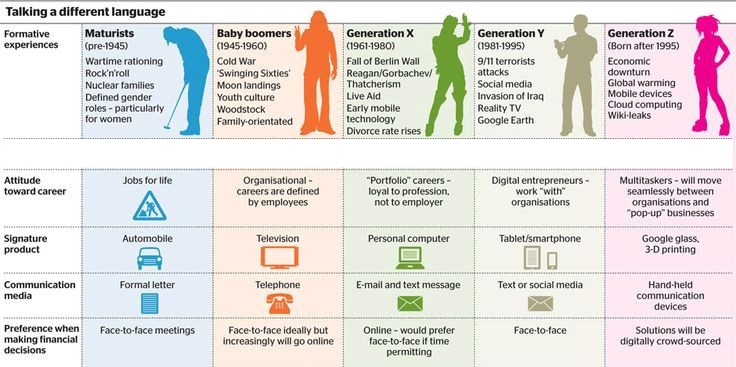
Gen Xers are a very conscious group, both self and otherwise. Independent and self-sufficient, they’re more likely to value authenticity over hype and tangible effects over wishfulness. If they perceive a hotel to be reliable and trustworthy, the hotel will gain their loyalty.
Being a structured, punctual group themselves, Generation X expects the same out of their hotel. Organizational applications are indispensable tools for impressing this group, as they are not only anticipating all of the amenities indicated to them before their arrival, on the hotel website or elsewhere, but also an organized response system for guest requests. Though they may not be looking for frills, whatever the hotel promised it provides should be done well.
Generation X is less likely than other generations to affiliate themselves with a particular brand, but if an individual establishment proves to be dependable, they will return again and again. Gain these repeat guests with the help of the RoomChecking application, improving hotel organization and simplifying the communication process between departments to ensure that Generation X has a dependable, authentic hotel experience.
Millennials (people born between 1982-2000) are a huge focus in today’s market, as they are not only a larger group than the baby boomers, they are also just starting out, making it important to build early loyalty. Additionally, they want to travel- up to 75% have a vested interest in traveling abroad.
Due to financial constraints like lower salaries and student loan debt, especially amongst American travelers, millennials are looking for the best value for their money; two-thirds will stick to a budget on a trip. For example, they would rather book a discounted room than a room that costs less at its regular price, because the perceived value is higher for the discounted room- if it cost more originally, it must be worth more. Especially in the new sharing economy, in order to bring millennial travelers to a hotel, the hotel’s online presence must be up to the standard that this group is used to seeing. This means that not only will they be looking at the user friendliness of the hotel’s website and its social media presence, they are also most likely to see negative reviews of a hotel on a website like TripAdvisor. 73% of millennials will use an online review site in planning their trip, so the hotel’s service standards should be a focal point for those looking to attract millennial travellers, whose choices are heavily influenced by other guests’ experiences.
Millennial travelers are looking for customized experiences, such as those offered by Starwood’s Aloft hotels, whose offerings include a hangover kit. This option is available on a guest-facing app, but will lose its “exclusive” quality if hotel employees lack the means necessary to communicate the request to the proper department. They also consider a lack of air-conditioning and Wi-Fi to be a deal-breaker, making these both areas that the hotel should consider when making a preventative maintenance plan.
Most millennials have spent hours online researching and planning their trips, so it’s essential to exceed their expectations not just for the sake of online reviews, but for the purpose of future loyalties as well. Impress this group with the quality of service in a hotel now and reap the benefits of repeat business from the most travel-focused generation ever.
usiness travelers’ expectations, as opposed to leisure travelers, are that the hotel will help them fulfill the duties for which they came in the most efficient way possible. When something goes wrong that hinders their ability to do their job, their view of the hotel will depend on the staff’s ability to quickly remedy the issue.
Business travelers are in search of a no-nonsense experience that provides exactly what they need when they need it. They are not making booking decisions or choices about their stay based on emotions; they are looking for somewhere they can work and sleep and maybe have a bit of respite from a hectic workday. They value in-room amenities that will help them complete the business they came to do, such as a coffee machine and an ironing board.
While location is one of the most important factors to business travelers, the most important amenity in a hotel is the availability of WiFi; in fact, amajority of business travelers would book with a hotel directly in exchange for free WiFithroughout their stay. If there is a problem with the internet connection and the hotel is unable to fix it quickly and provide a viable alternative in the meantime, or if the hotel fails to provide the in-room amenities mentioned above, they will look to take their business elsewhere upon future trips.
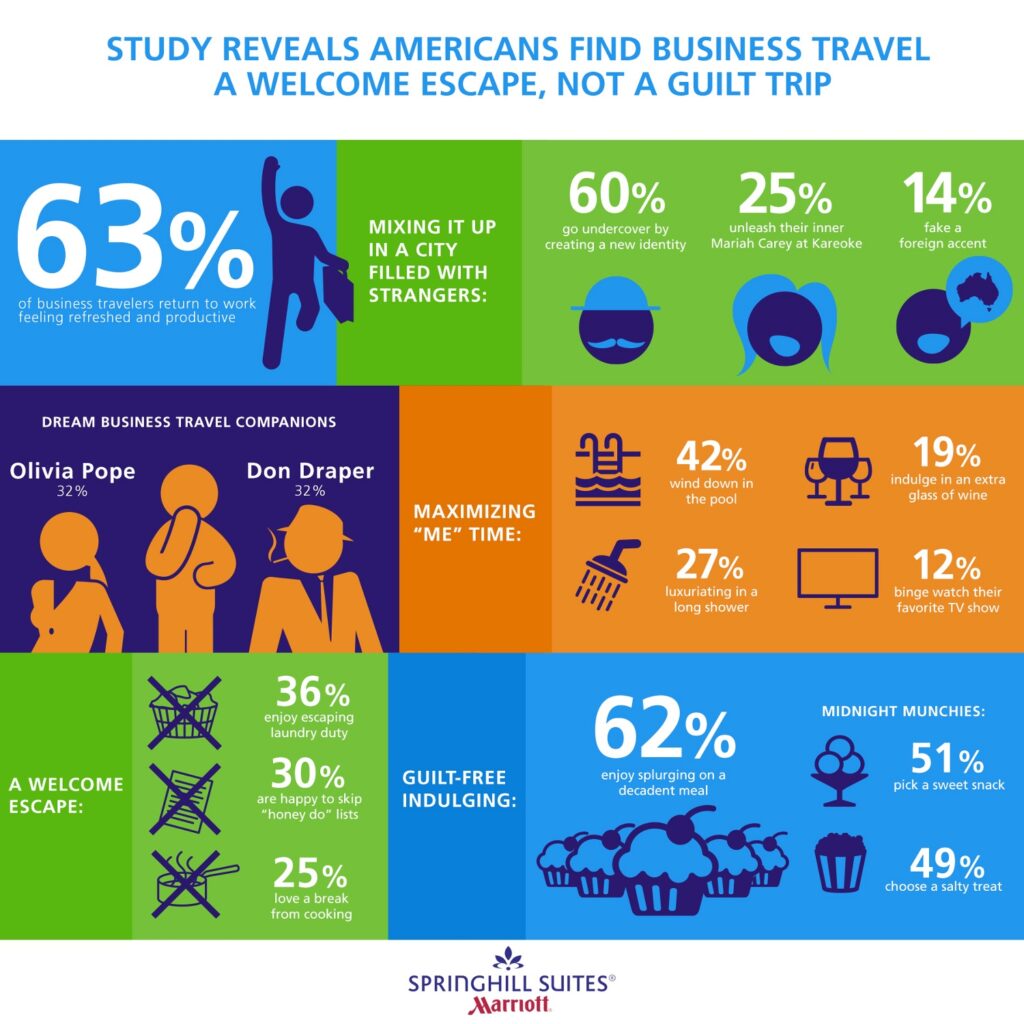
A key difference between leisure and business guests is the possibility of a corporate or loyalty plan with the traveler’s company. Though this means that guests may not be paying for the trip themselves, this is no excuse to skimp on quality of service, as their dissatisfaction will be reported back to the company and the hotel could risk losing more than just one individual client’s business.
For a hotel optimized to cater to business travelers, organization and efficiency reign supreme, so any adopted solution should help the hotel achieve the highest standard possible of both for satisfied guests.